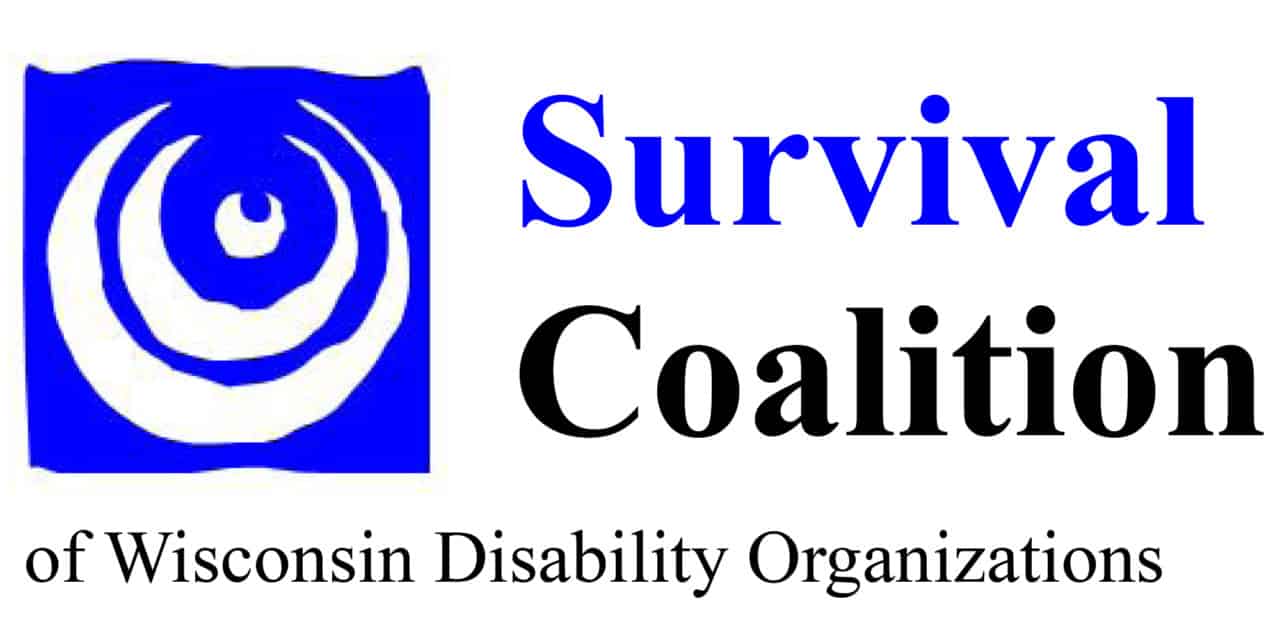Almost 500 people with disabilities and older adults representing 78% of Wisconsin counties responded to Survival Coalition’s COVID-19 survey. All of Survival Coalition thanks everyone who has filled out one of the recent surveys. This information is critical in advocating for appropriate policy for people with disabilities and their families. Please stay tuned for more surveys in the future as this is the easiest medium for getting data, especially during Safer-at-Home.
Quick Facts
- In Wisconsin 36.5% of adults (1,612,619 people) are at high risk of serious illness if infected by COVID-19[1].
- People living in congregant settings like nursing homes and group homes are at higher risk.[2]
- In Wisconsin more than 85,000 people rely on in-home personal care, home health, and many other services to stay in their own homes and out of hospitals and nursing homes.
- People in Family Care, IRIS, and Children’s long term care rely on personal and home health workers for daily care like bathing, dressing, getting into and out of beds and wheelchairs, and prevention of serious conditions—like pressure sores and obstructed bowels—that can lead to hospitalization.
- The direct care workforce—already in crisis—does not have the needed gloves, masks, and protective equipment to protect themselves from getting infected or potentially exposing our most vulnerable populations to the virus.
- These essential workers—average wage $11.54[3]—are caring for people even as their staffing becomes even more strained without overtime, hazard pay, paid sick time, and often are without employer sponsored health insurance.
- Many people are alone, and completely dependent on paid staff.
- Many families, including elderly parents, are being strained to the breaking point as they try to fill in caregiving gaps, often while struggling to homeschool children and work from home
Key Survey Findings:
- 40% worry if they get COVID-19 and are hospitalized they might not meet hospital triage criteria and may not get a ventilator because of age or disability
- 37% report that families are providing some or all daily personal care support instead of their normal paid staff
- All respondents are experiencing disruptions and reductions in the supports and services they need to stay healthy or allow family members to work, including losing personal care and home health care, transportation to get to essential businesses and medical appointments, prescription drugs and durable medical supplies, therapies that are needed to stay or become more independent.
- In the next two weeks, people are very or extremely concerned being unable to get help if there is a medical emergency, not knowing what to do if they are not getting the help they need, losing their careworkers, and losing the routine care needed to maintain health.
[1] https://www.kff.org/global-health-policy/issue-brief/how-many-adults-are-at-risk-of-serious-illness-if-infected-with-coronavirus/
[2] https://www.cdc.gov/coronavirus/2019-ncov/need-extra-precautions/groups-at-higher-risk.html#nursing-homes-or-long-term-care-facilities
[3] https://phinational.org/policy-research/workforce-data-center/#tab=State+Data&var=Wage+Trends&states=55

